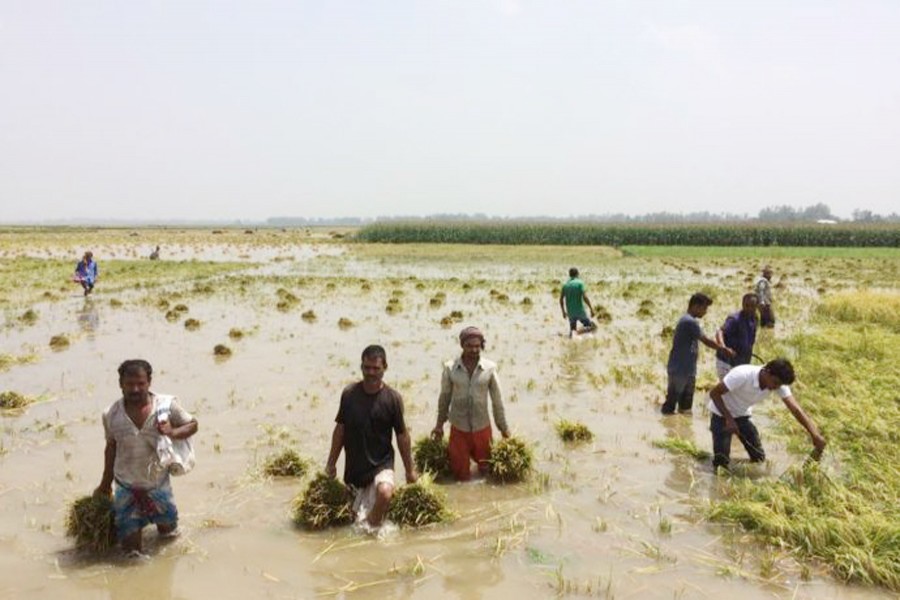Bangladesh is undeniably the world's most disaster - prone country. Repeated disasters destroy the economic resource base of the poor people and drain out economic potentials. Effective humanitarian coordination can ensure the best use of resources to achieve the most appropriate response to the needs of the people affected by a crisis.
The impacts of disasters could be minimised through proper disaster management planning and by integrating disaster management activities into local and national development plans. It is apparent that effective coordination is an essential prerequisite for disaster management. The coordination of disaster response is most demanding as it involves requirements typical of an emergency situation that include, among others, high uncertainty, the necessity for quick decision making, and response under available resources.
Although Bangladesh has gained repute across the world in combating disasters, the task is a challenging one. The government of Bangladesh has taken a number of significant steps over the last few years for building up institutional arrangements from the national to the union levels for effective and systematic disaster management, in alleviating the sufferings of disaster victims. To maintain proper coordination amongst the concerned ministries, departments, line agencies, local government bodies and community people and also to ensure their proper functioning to minimise human suffering, the government has formulated a set of mechanisms from the national to the grass-roots levels. For these mechanisms to be best operative, the Standing Orders on Disaster (SOD) act as a guidebook. In 2007, the government introduced the SOD, which provides guidelines for implementing the Bangladesh Disaster Management Programme. The SOD also outlines the roles and responsibilities of various committees, ministries, departments and organisations involved in disaster management. In keeping with the SOD, disaster management committees have been set up starting from the National Disaster Management Council headed by the Prime Minister to the Union Disaster Management Committee headed by the Chairman of union council.
In Bangladesh, disaster management is fraught with some problems because of the number of stakeholders, prevalence of various forums at different levels and a complex system of government committees. While coordination of the response to cyclone Sidr in 2007 was considered functional, in the subsequent years there was the concern that the preparedness for a coordinated response was not maintained. It is also true that in spite of the generally positive views on the coordination after cyclone Sidr, some reviews did highlight gaps in the system. The government-NGO coordination committee on disaster management is coordinated by the Department of Disaster Management. Although stakeholders expect these coordination meetings to be held at the time of a disaster, as well as at other times, the meetings are held for disasters of significant magnitude. It is a platform where information can be shared and decision taken but in its current shape, it doesn't appear to be an effective mechanism for coordination. In addition, other international actors such as the UN and development partners are heading towards a broad and inclusive coordination for comprehensive disaster management under the auspicious of Local Consultative Group (LCG) co-chaired by the Secretary to the ministry of disaster management and the UN Resident Coordinator in Bangladesh. Nevertheless, there is a concern over the nature of coordination that these meetings focus on - largely sharing information about who is doing what and where, but with limited actions and without enough focus on the bigger picture in terms of the nature of the problem and development of a shared response strategy/plan.
There is a need to work with the government in establishing good quality information on "disaster events" in order to establish preparedness, and to address any gaps in the government's capacity to respond to the situation. This should include strong advocacy on the importance of sharing information promptly (regardless of the need for assistance) and on the need for an effective forum where information generated by non-government actors can be shared meaningfully. Effort should be made to consider the legitimacy of initiating coordination by mapping out how to trigger a coordinated approach to an event. The international humanitarian community should keep up their efforts with more community-focused interventions that relate directly to preparedness for coordinated response.
The writer is Assistant Professor, Department of Government and Politics, Jahangirnagar University & former UN development practitioner. [email protected]


